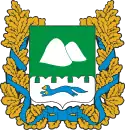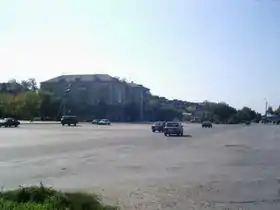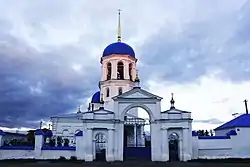Kurgan Oblast
Kurgan Oblast (Russian: Курга́нская о́бласть, romanized: Kurganskaya oblast) is a federal subject of Russia (an oblast). Its administrative center is the city of Kurgan. According to the 2021 Census, the population was 776,661,[11] down from 910,807 recorded in the 2010 Census.[12]
Kurgan Oblast | |
|---|---|
| Курганская область | |
 Flag  Coat of arms | |
 | |
| Coordinates: 55°34′N 64°45′E | |
| Country | Russia |
| Federal district | Ural[1] |
| Economic region | Ural[2] |
| Administrative center | Kurgan[3] |
| Government | |
| • Body | Oblast Duma[4] |
| • Governor[5] | Vadim Shumkov |
| Area | |
| • Total | 71,488 km2 (27,602 sq mi) |
| • Rank | 43rd |
| Population | |
| • Total | 776,661 |
| • Estimate (2018)[8] | 845,537 |
| • Rank | 59th |
| • Density | 11/km2 (28/sq mi) |
| • Urban | 63.9% |
| • Rural | 36.1% |
| Time zone | UTC+5 (MSK+2 |
| ISO 3166 code | RU-KGN |
| License plates | 45 |
| OKTMO ID | 37000000 |
| Official languages | Russian[10] |
| Website | http://www.kurganobl.ru/ |
History
Formed by Decree of the Presidium of the Supreme Soviet of the USSR of February 6, 1943. The region included 32 districts of the eastern part of the Chelyabinsk region and 4 districts of the Omsk region with a total population of 975,000.
Recipient of the Order of Lenin (1959).
Geography
Kurgan Oblast is located in Southern Russia and is part of the Urals Federal District. It shares borders with Chelyabinsk Oblast to the west, Sverdlovsk Oblast to the north-west, Tyumen Oblast to the north-east, and Kazakhstan (Kostanay and North Kazakhstan Region) to the south.
Climate
The oblast has a severe continental climate with long cold winters and warm summers with regular droughts. The average January temperature is −18 °C (0 °F), and the average temperature in the warmest month (July) is +19 °C (66 °F). Annual precipitation is about 400 millimeters (16 in).[13]
Politics
During the Soviet period, the high authority in the oblast was shared between three persons: The first secretary of the Kurgan CPSU Committee (who in reality had the biggest authority), the chairman of the oblast Soviet (legislative power), and the Chairman of the oblast Executive Committee (executive power). Since 1991, CPSU lost all the power, and the head of the Oblast administration, and eventually the governor was appointed/elected alongside elected regional parliament.
The Charter of Kurgan Oblast is the fundamental law of the region. The Kurgan Oblast Duma is the province's standing legislative (representative) body. The Oblast Duma consists of 34 members and exercises its authority by passing laws, resolutions, and other legal acts and by supervising the implementation and observance of the laws and other legal acts passed by it. The highest executive body is the Oblast Government, which includes territorial executive bodies such as district administrations, committees, and commissions that facilitate development and run the day to day matters of the province. The Oblast administration supports the activities of the Governor who is the highest official and acts as guarantor of the observance of the oblast Charter in accordance with the Constitution of Russia.
After the last elections held in 2015 the United Russia Party currently holds the majority of seats in the Oblast Duma. Elections of deputies of the Kurgan Regional Duma of the VII convocation are scheduled for 2020.
Administrative divisions
Economy
Kurgan Oblast borders on the oil- and gas-bearing districts of Tyumen Oblast and is also close to similar districts in Tomsk Oblast. Large oil and gas pipelines pass through its territory, and Ural and Siberian oil refineries are fairly close. The main industrial centers are Kurgan, and Shadrinsk.[13]
The oblast does not have large economic mineral reserves; therefore, it has developed mainly on the basis of subindustries associated with processing of agricultural production and assembly and packaging of finished products. The food industry is well developed here, with meat-packing plants, mills, creameries, and powdered milk factories.[13]
Modern large-scale industry began developing during World War II, when sixteen enterprises from western regions of the country were evacuated here in 1941–1942.
Demographics
Population: 776,661 (2021 Census);[11] 910,807 (2010 Census);[12] 1,019,532 (2002 Census);[14] 1,104,872 (1989 Census).[15]
Russians (823,722) are the largest ethnic group in the Kurgan Oblast, making up 92.5% of the population. Other prominent ethnic groups in the oblast include[12] Tatars (17,017) at 1.9%, Bashkirs (12,257) at 1.4%, Kazakhs (11,939) 1.3%, and Ukrainians (7,080) at 0.8%. Other ethnicities are 2.1%. Additionally, 20,017 people were registered from administrative databases, and could not declare an ethnicity. It is estimated that the proportion of ethnicities in this group is the same as that of the declared group.[16]
Vital statistics for 2022:[17][18]
- Births: 6,353 (7.9 per 1,000)
- Deaths: 12,592 (15.7 per 1,000)
Total fertility rate (2022):[19]
1.68 children per woman
Life expectancy (2021):[20]
Total — 68.29 years (male — 63.29, female — 73.48)
Settlements
Largest cities or towns in Kurgan Oblast 2010 Russian Census | |||||||||
|---|---|---|---|---|---|---|---|---|---|
| Rank | Administrative Division | Pop. | |||||||
 Kurgan  Shadrinsk |
1 | Kurgan | City of oblast significance of Kurgan | 333,606 | .jpg.webp) Shumikha  Kurtamysh | ||||
| 2 | Shadrinsk | Shadrinsky District | 77,756 | ||||||
| 3 | Shumikha | Shumikhinsky District | 17,819 | ||||||
| 4 | Kurtamysh | Kurtamyshsky District | 17,099 | ||||||
| 5 | Kataysk | Kataysky District | 14,003 | ||||||
| 6 | Dalmatovo | Dalmatovsky District | 13,911 | ||||||
| 7 | Petukhovo | Petukhovsky District | 11,292 | ||||||
| 8 | Shchuchye | Shchuchansky District | 10,973 | ||||||
| 9 | Vargashi | Vargashinsky District | 9,254 | ||||||
| 10 | Kargapolye | Kargapolsky District | 8,433 | ||||||
Religion
According to a 2012 survey[21] 28.4% of the population of Kurgan Oblast adheres to the Russian Orthodox Church, 6% are nondenominational Christians (with the exclusion of such-defined Protestant churches), 2% are adherents of Islam, 1% are adherents of the Slavic native faith (Rodnovery), and 0.4% are adherents of forms of Hinduism (Vedism, Krishnaism or Tantrism). In addition, 36% of the population declares to be "spiritual but not religious", 14% is atheist, and 12.2% follows other religions or did not give an answer to the question.[21]
Notable people
- Yuri Balashov (born March 12, 1949), chess grandmaster
- Oleg Bogomolov (born October 4, 1950), former Governor of Kurgan Oblast
- Fyodor Bronnikov (1827–1902), painter
- Dmitri Bushmanov (born September 30, 1978), association football player
- Aleksandr Cherepanov (November 21, 1895 – July 6, 1984), lieutenant-general
- Dumitru Diacov (born February 10, 1952), Moldovan politician
- Viktor Dubynin (February 1, 1943 – November 22, 1992), Army General
- Maxim Fadeev (born May 6, 1968), singer-songwriter, composer and producer
- Pavel Fitin (December 28, 1907 – December 24, 1971), director of Soviet intelligence
- Filipp Golikov (July 30, 1900 – July 29, 1980), Marshal of the Soviet Union
- Sergey Gritsevets (July 19, 1909 – September 16, 1939), major, pilot and twice recipient of the honorary title of Hero of the Soviet Union.
- Gavriil Ilizarov (June 15, 1921 – July 24, 1992), physician
- Vyacheslav Kamoltsev (born December 14, 1971), association football player
- Svetlana Kapanina (born December 22, 1968), aerobatic pilot
- Anatoly Karelin (July 16, 1922 – January 3, 1974), Major General of aviation
- Leonid Khabarov (born May 8, 1947), Colonel
- Larisa Korobeynikova (born March 26, 1987), fencer
- Evgeni Krasilnikov (born April 7, 1965), volleyball player
- Leonid Krasin (July 3 (15), 1870 – November 24, 1926), politician and diplomat
- Ivan Kurpishev (born March 2, 1969), powerlifter
- Dmitri Loskov (born February 12, 1974), association football player
- Aleksey Merzlyakov (March 22, 1778 - August 7, 1830), poet, critic, translator, and professor
- Yana Romanova (born May 11, 1983), biathlete
- Sergei Rublevsky (born October 15, 1974), chess grandmaster
- Mikhail Ryumin (September 1, 1913 – July 22, 1954), Deputy Head of the Ministry for State Security (Soviet Union)
- Yulia Savicheva (born 14 February 1987), singer
- Ivan Shadr (February 11, 1887 – April 3, 1941), sculptor and medalist
- Alexander Solonik (October 16, 1960 – January 31, 1997), hitman
- Elena Temnikova (born April 18, 1985), singer
- Alla Vazhenina (born May 29, 1983), weightlifter
- Aleksandr Vinogradov (September 9, 1930 – June 14, 2011), journalist and writer
- Sergei Vinogradov (April 16, 1958 – December 16, 2010), journalist, translator and writer
- Kirill A. Yevstigneyev (February 17, 1917 – August 29, 1996), Major General of aviation
References
Notes
- Президент Российской Федерации. Указ №849 от 13 мая 2000 г. «О полномочном представителе Президента Российской Федерации в федеральном округе». Вступил в силу 13 мая 2000 г. Опубликован: "Собрание законодательства РФ", No. 20, ст. 2112, 15 мая 2000 г. (President of the Russian Federation. Decree #849 of May 13, 2000 On the Plenipotentiary Representative of the President of the Russian Federation in a Federal District. Effective as of May 13, 2000.).
- Госстандарт Российской Федерации. №ОК 024-95 27 декабря 1995 г. «Общероссийский классификатор экономических регионов. 2. Экономические районы», в ред. Изменения №5/2001 ОКЭР. (Gosstandart of the Russian Federation. #OK 024-95 December 27, 1995 Russian Classification of Economic Regions. 2. Economic Regions, as amended by the Amendment #5/2001 OKER. ).
- Charter of Kurgan Oblast, Article 13
- Charter of Kurgan Oblast, Article 80
- Charter of Kurgan Oblast, Article 78-1
- "Сведения о наличии и распределении земель в Российской Федерации на 01.01.2019 (в разрезе субъектов Российской Федерации)". Federal Service for State Registration, Cadastre and Cartography. Archived from the original on February 9, 2022. Retrieved August 29, 2023.
- "Оценка численности постоянного населения по субъектам Российской Федерации". Federal State Statistics Service. Retrieved September 1, 2022.
- "26. Численность постоянного населения Российской Федерации по муниципальным образованиям на 1 января 2018 года". Federal State Statistics Service. Retrieved January 23, 2019.
- "Об исчислении времени". Официальный интернет-портал правовой информации (in Russian). June 3, 2011. Retrieved January 19, 2019.
- Official throughout the Russian Federation according to Article 68.1 of the Constitution of Russia.
- Russian Federal State Statistics Service. Всероссийская перепись населения 2020 года. Том 1 [2020 All-Russian Population Census, vol. 1] (XLS) (in Russian). Federal State Statistics Service.
- Russian Federal State Statistics Service (2011). Всероссийская перепись населения 2010 года. Том 1 [2010 All-Russian Population Census, vol. 1]. Всероссийская перепись населения 2010 года [2010 All-Russia Population Census] (in Russian). Federal State Statistics Service.
- Kurgan Region Archived November 27, 2010, at the Wayback Machine
- Russian Federal State Statistics Service (May 21, 2004). Численность населения России, субъектов Российской Федерации в составе федеральных округов, районов, городских поселений, сельских населённых пунктов – районных центров и сельских населённых пунктов с населением 3 тысячи и более человек [Population of Russia, Its Federal Districts, Federal Subjects, Districts, Urban Localities, Rural Localities—Administrative Centers, and Rural Localities with Population of Over 3,000] (XLS). Всероссийская перепись населения 2002 года [All-Russia Population Census of 2002] (in Russian).
- Всесоюзная перепись населения 1989 г. Численность наличного населения союзных и автономных республик, автономных областей и округов, краёв, областей, районов, городских поселений и сёл-райцентров [All Union Population Census of 1989: Present Population of Union and Autonomous Republics, Autonomous Oblasts and Okrugs, Krais, Oblasts, Districts, Urban Settlements, and Villages Serving as District Administrative Centers]. Всесоюзная перепись населения 1989 года [All-Union Population Census of 1989] (in Russian). Институт демографии Национального исследовательского университета: Высшая школа экономики [Institute of Demography at the National Research University: Higher School of Economics]. 1989 – via Demoscope Weekly.
- "ВПН-2010". www.perepis-2010.ru. Archived from the original on December 25, 2018. Retrieved April 5, 2018.
- "Information on the number of registered births, deaths, marriages and divorces for January to December 2022". ROSSTAT. Archived from the original on March 2, 2023. Retrieved February 21, 2023.
- "Birth rate, mortality rate, natural increase, marriage rate, divorce rate for January to December 2022". ROSSTAT. Archived from the original on March 2, 2023. Retrieved February 21, 2023.
- Суммарный коэффициент рождаемости [Total fertility rate]. Russian Federal State Statistics Service (in Russian). Archived from the original (XLSX) on August 10, 2023. Retrieved August 10, 2023.
- "Демографический ежегодник России" [The Demographic Yearbook of Russia] (in Russian). Federal State Statistics Service of Russia (Rosstat). Retrieved June 1, 2022.
- "Arena: Atlas of Religions and Nationalities in Russia". Sreda, 2012.
- 2012 Arena Atlas Religion Maps. "Ogonek", № 34 (5243), 27/08/2012. Retrieved 21/04/2017. Archived.
Sources
- Курганская областная Дума. Закон №1 от 16 декабря 1994 г. «Устав Курганской области», в ред. Закона №108 от 30 ноября 2015 г. «О внесении изменений в Устав Курганской области». Вступил в силу после официального опубликования. Опубликован: "Новый мир", №242, 21 декабря 1994 г. (Kurgan Oblast Duma. Law #1 of December 16, 1994 Charter of Kurgan Oblast, as amended by the Law #108 of November 30, 2015 On Amending the Charter of Kurgan Oblast. Effective as of after the official publication.).
External links
 Media related to Kurgan Oblast at Wikimedia Commons
Media related to Kurgan Oblast at Wikimedia Commons- Official website of the Oblast Duma Archived March 11, 2008, at the Wayback Machine (in Russian)
- News portal (in Russian)